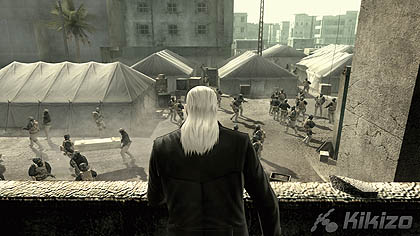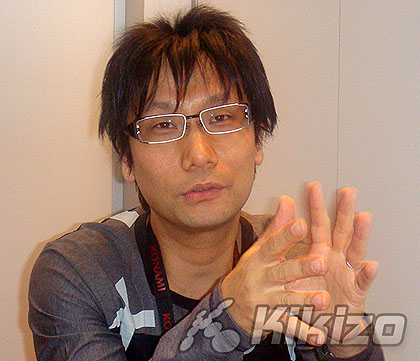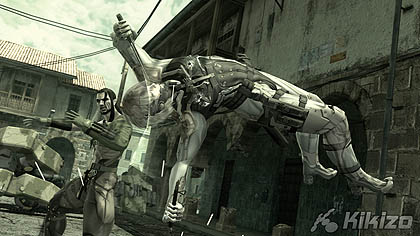Hideo Kojima: The Kikizo Interview 2008
We sit down for a rare discussion with the idolised creator of the Metal Gear Solid series, to reflect on MGS4 and find out what happens next for Kojima Productions.
Page 2
Kikizo: With the greatest respect, you told us in 2001 that Metal Gear Solid 2 would be the last MGS title you would work on yourself. You said the same about MGS3, and you are now saying the same about MGS4. Obviously, this is a series that you love and are extremely close to - can you really see yourself - say after another ten years - not having directed a fifth game with a new story angle?
Kojima: [Laughs and nods, as if to acknowledge our point]. Well, that's a difficult question to answer! I say frankly, on a private level, that I always intend to stay true to these statements; I do always say what I actually feel at that time, after each Metal Gear, when I say I am going to move on to the next project. But it's like when Hayao Miyazaki says he is not going to do more, and then always ends up doing it. I think I am kind of in a similar situation; I have ideas other than Metal Gear, and I want to go on to make other new games, but for political, business or technology reasons, there is always a time when I have to return. But I have to say, my feeling hasn't changed; I would like to pass on the Metal Gear series to younger staff members, and then go on to produce the title, and not be so attached to it.
I always want to be in a creative position, where I can concentrate and grow as a creator. I feel if I don't do that, I might as well not be in the industry. But on the other hand, I am looking after and responsible for the business side of Konami as a whole, as well as for Kojima Productions, and it would be ridiculous for me on the business side to say I will just bring out a game every four years. Therefore, I would like to keep doing what I do, but at the same time, pass my own ideas to the staff who can take over and produce. That's what I have been doing, and I would like to keep doing it this way. And in my spare time I want to establish a new game, which I have been wanting to do for a long time. I do have strong urges to create a new title other than the Metal Gear series. As a businessperson, I might worry whether it will sell more than the Metal Gear series, but that's another issue!
But when I said it's a difficult question to answer, I mean that when we look ten years into the future, maybe yes, I may well end up spending more time on the Metal Gear series!
Kikizo: Here's one interesting conflict when you mention design versus business. In the 2001 interview you did with us, you described a concept for a what you called a 'raw game': you buy the game, you play it, and if you lose it's over, and you have to buy it again! I wonder if this is something you still think of, seven years later? Is this the game you refer to when you mention the new titles in your mind?
Kojima: [Laughs] Well that 'raw game' concept is basically just one of the ideas I had back then, meaning combinations could always apply when creating video games; I could take that idea and other ideas that I've had, and make it into one game. But the thing that I am trying to work out right now is an idea that I had ten years ago, which I am still worried on the technical side whether it's possible or not even today.
Kikizo: What do you think of the trend towards simplified control led by the Wii?
Kojima: Well I don't have any concerns actually, because the bottom line is, when you design a game, you have to target who you want to target. And you design knowing which target to approach, and that's the key. Even when people say that they may change the interface to a very simplified version, I agree and disagree at the same time; look at games that are more difficult because of that new interface, like a racing game for example: it was right or left in the past, but now you have to manoeuvre using the motion controller - this is actually more difficult than in past racing games! In traditional games you practise a lot, and you kind of 'upgrade yourself', and then you clear the game. So I think there are pros and cons.
For some players, motion control will come naturally straight away, but for others it might feel difficult, so the game designer is really now responsible to think about which direction he or she should take. I played Killzone 2 this morning, actually, and it was funny because the FPS control was traditional FPS, but when you come to a door and have to kind of open the latch, you all of a sudden have to use the Sixaxis, and nobody was succeeding. So maybe they were kind of rushing to implement the technical design, which might not be the correct way to do it in that title.








 Satoru Iwata Video Interview - the late Nintendo president spoke with Kikizo in 2004 as 'Nintendo Revolution' loomed.
Satoru Iwata Video Interview - the late Nintendo president spoke with Kikizo in 2004 as 'Nintendo Revolution' loomed. Kaz Hirai Video Interview - the first of Kikizo's interviews with the man who went on to become global head of Sony.
Kaz Hirai Video Interview - the first of Kikizo's interviews with the man who went on to become global head of Sony. Ed Fries Video Interview - one of Xbox's founders discusses an epic journey from Excel to Xbox.
Ed Fries Video Interview - one of Xbox's founders discusses an epic journey from Excel to Xbox. Yu Suzuki, the Kikizo Interview - we spend time with one of gaming's most revered creators.
Yu Suzuki, the Kikizo Interview - we spend time with one of gaming's most revered creators. Tetris - The Making of an Icon: Alexey Pajitnov and Henk Rogers reveal the fascinating story behind Tetris
Tetris - The Making of an Icon: Alexey Pajitnov and Henk Rogers reveal the fascinating story behind Tetris Rare founders, Chris and Tim Stamper - their only interview? Genuinely 'rare' sit down with founders of the legendary studio.
Rare founders, Chris and Tim Stamper - their only interview? Genuinely 'rare' sit down with founders of the legendary studio. The History of First-Person Shooters - a retrospective, from Maze War to Modern Warfare
The History of First-Person Shooters - a retrospective, from Maze War to Modern Warfare